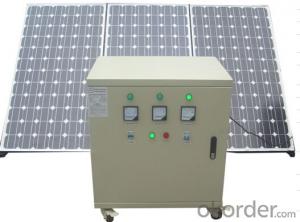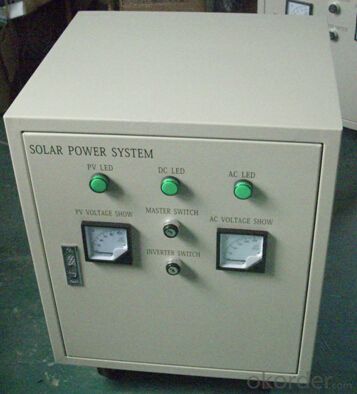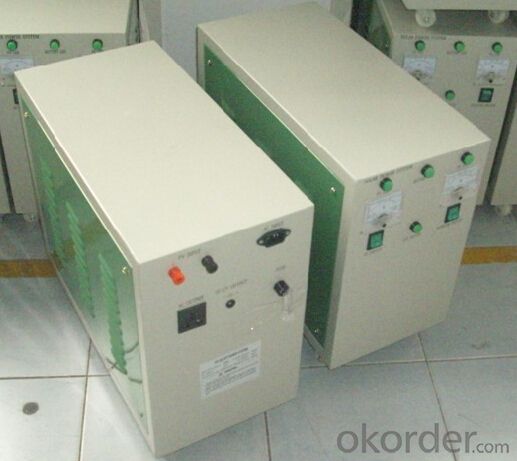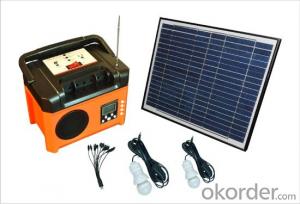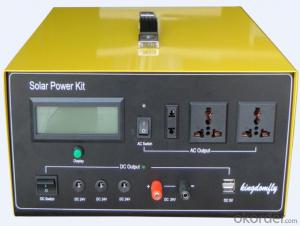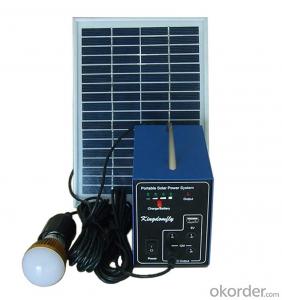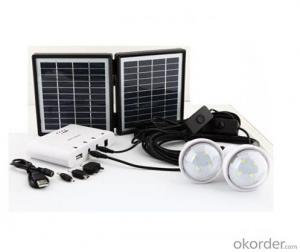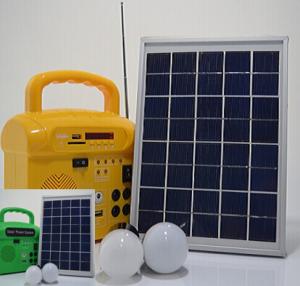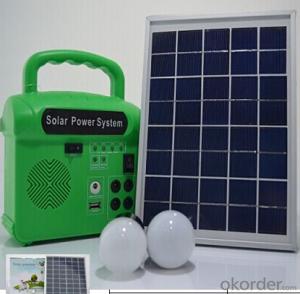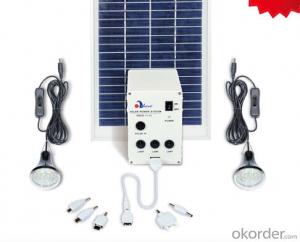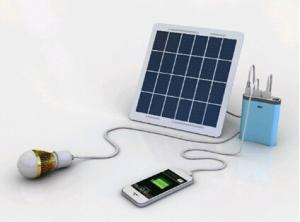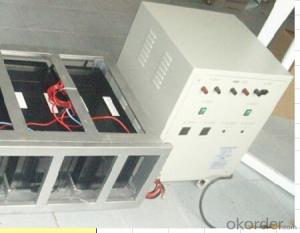Baywa Re Solar Energy Systems CNBM Solar Home System Roof System Capacity-1000W
- Loading Port:
- Shanghai
- Payment Terms:
- TT or LC
- Min Order Qty:
- 5 pc
- Supply Capability:
- 30000 pc/month
OKorder Service Pledge
OKorder Financial Service
You Might Also Like
Introduction of Solar Home System
Solar Home System is composed by Solar Panels, Inverters, Charger Controller, Battery, Cable, Mounting Bracket, which is applied to produce electricity for home use.
Solar Home System is quite suitable product in urban area and the place which is short of electricity. Our Small Solar Home System own great benifits compare with other kind electricity resources:
Electricity generating cost of Solar Home System is much cheaper than diesel engine. Beside low electricity making cost, solar system products also have the features of noiseless, clean energy, environmentally friendly and can access to many different electric appliance.
Picture of Our Factory

Working Principle of Solar Home System
The stand alone Solar Home System is an off-grid solar system which uses batteries to store the solar energy. Stand alone solar system solutions design for those who are not able or willing to connect to electricity grid.
However, our on-grid solar home system can be connected to the grid for utilization of grid electricity power. Our solar system can add relative equipment as our customer’s requirement which have the function of switching to city electricity automatically. The solar system can use battery power in priority, if sunshine is not so good or loads consumption is too high which cause battery power insufficient. Then system can switch automatically to grid power supply. Meanwhile, the system can charge the batteries with grid power until batteries are fully charged. Then the solar system will switch back to battery power supply.
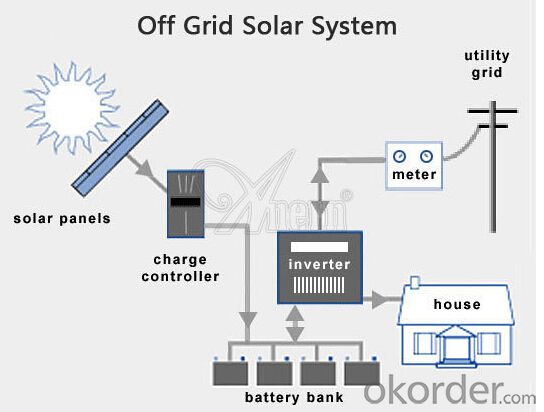
Product Details of Solar Home System
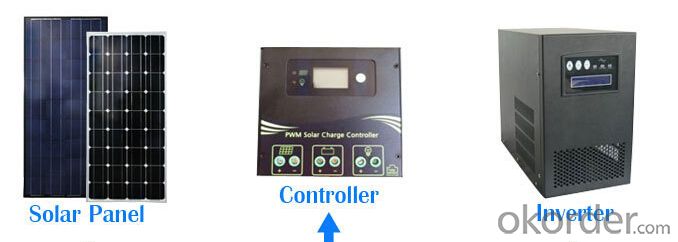
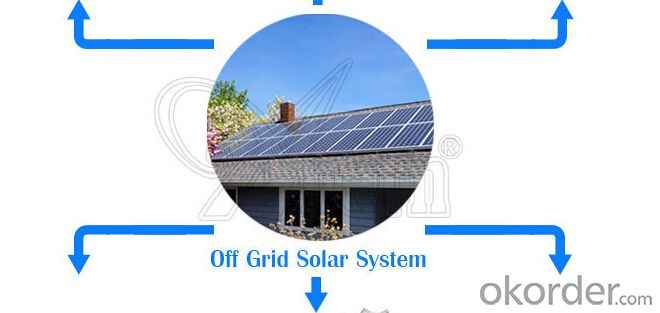

Specification of Solar Home System
Technical data: | ||||||||
Inverter | Rated load power | 1500W | ||||||
Output wave | Pure sine wave | |||||||
Input voltage | 24V | |||||||
Output voltage | DC:12V | |||||||
Output frequency | 50HZ/60HZ | |||||||
Precision of output frequency | ±6% | |||||||
Solar panel | Pmax | 167W*6PCS | ||||||
Vmp | 36V | |||||||
Imp | 27.8A | |||||||
Charger | Charger voltage & current | 24V/20A*3 | ||||||
Battery | Capacity | 12V/150AH*4PCS | ||||||
Power box | Spray paint iron box,with input,output, ammeter,voltmeter,master switch and so on. | |||||||
Package data: | ||||||||
Part | Size (L*W*H mm) | Weight (kg) | 20' (pcs) | 40' (pcs) | ||||
Power box | 580*520*540 | 60 | 96Sets | 240Sets | ||||
Solar panel | 1600*830*90 | 90 | ||||||
Battery | 540*520*350 | 220 | ||||||
Loading electrical equipment(For Consulting) | ||||||||
Name of Load | Power(W) | Quantity | Working Time per Day (H) | Working Days | ||||
Color TV | 65W | 1 | 6 | 3 days | ||||
Satellite TV Receivers | 25W | 1 | 6 | 3 days | ||||
lamp | 11W | 8 | 8 | 3 days | ||||
Computer | 150W | 2 | 6 | 3 days | ||||
FAN | 60W | 2 | 6 | 3 days | ||||
Other | 100W | 1 | 4 | 3 days | ||||
Advantage of Our Solar Home System
1 Excellent Performance: Our Solar Home System is composed by Brand Standard Kits with high quality. Our solar system has the advantage of high efficiency and stable operation. We can ensure our product with a long life period.
2. Small Orders Accepted: We can accept small orders as our customer’s trial order.
3. Warehouse: We have warehouse overseas which can bring great convenience to our customer to pick up the products.
FAQ
Q: Could you introduce the background of your company?
A: We are a Group corp. with 1GW capacity in China, which is Okorder’s registered VIP Supplier, possess Financial Service from Okorder.com.
Q: Required mainly certificates (CE&IEC/TUV/RoHS)?
A: Our products are certificated by CE RoHS, IEC, ISO, TUV, UL etc.
Q: Your main exported market is?
A: Main markets of our products is: South-east Asia, Mid-east, Arica, East Europe and Latin America.
- Q: How do solar energy systems impact the local economy?
- Solar energy systems can have a positive impact on the local economy in several ways. Firstly, the installation and maintenance of solar panels create job opportunities, contributing to local employment. Additionally, solar energy systems reduce reliance on imported fossil fuels, resulting in cost savings for consumers and businesses. This, in turn, can stimulate local spending and investment. Moreover, solar energy systems can generate revenue through excess energy production, as surplus electricity can be sold back to the grid. Lastly, the development of a local solar industry can attract new businesses, foster innovation, and position the community as a leader in renewable energy, attracting further economic opportunities.
- Q: How do solar energy systems impact energy efficiency measures?
- Solar energy systems have a positive impact on energy efficiency measures by reducing the overall energy consumption of a building or facility. By harnessing the power of the sun, solar panels generate clean and renewable electricity, which can offset the need for traditional energy sources. This not only lowers energy costs but also reduces greenhouse gas emissions. Furthermore, solar energy systems can integrate with energy-efficient technologies such as LED lighting or smart thermostats, maximizing the overall efficiency and sustainability of a building.
- Q: Can solar energy systems be used in powering scientific research vessels or marine laboratories?
- Yes, solar energy systems can be used to power scientific research vessels or marine laboratories. Solar panels can be installed on the vessels or on nearby platforms to harness sunlight and convert it into electricity, which can then be used to power various equipment and systems onboard, such as navigation devices, communication systems, lighting, and scientific instruments. This not only reduces reliance on fossil fuels but also provides a sustainable and renewable energy source for these facilities, enabling them to operate efficiently and environmentally responsibly.
- Q: What is the difference between a solar thermal system and a photovoltaic system?
- A solar thermal system and a photovoltaic system are both forms of solar energy systems, but they function differently and have distinct purposes. A solar thermal system is primarily used for heating purposes. It harnesses the sun's energy to heat water or air directly. This is achieved by using solar collectors, which absorb sunlight and convert it into heat. The heated water or air is then used for various applications like space heating, water heating, or even for powering turbines to generate electricity. Solar thermal systems are commonly used in residential, commercial, and industrial settings to provide hot water or heating solutions. On the other hand, a photovoltaic system, commonly known as solar panels, is designed to generate electricity from sunlight. It utilizes photovoltaic cells, typically made of silicon, to directly convert sunlight into electricity through the photovoltaic effect. These cells are interconnected in solar panels, and multiple panels can be combined to form an entire photovoltaic system. The electricity generated by a photovoltaic system can be used to power various electrical devices, appliances, or even feed into the grid to offset energy consumption. In summary, the main difference between a solar thermal system and a photovoltaic system lies in their respective purposes. Solar thermal systems primarily focus on heating applications, utilizing the sun's energy to heat water or air directly. On the other hand, photovoltaic systems are designed to produce electricity by converting sunlight into electrical energy using solar panels.
- Q: What permits or approvals are required for installing a solar energy system?
- The permits and approvals required for installing a solar energy system may vary depending on the location and regulations of the specific jurisdiction. Generally, some common permits and approvals that might be required include building permits, electrical permits, zoning permits, and interconnection agreements with the local utility company. It is recommended to consult with local authorities or hire a professional installer who can guide you through the specific requirements in your area.
- Q: Can solar energy systems be used in powering movie theaters or entertainment venues?
- Yes, solar energy systems can definitely be used to power movie theaters or entertainment venues. These systems can be installed on the roof or surrounding areas of the facility to generate clean and renewable energy. With advancements in solar technology, such as more efficient panels and energy storage solutions, it is increasingly feasible to meet the high energy demands of these venues. Additionally, the use of solar energy can reduce operating costs, contribute to environmental sustainability, and serve as a positive example for promoting renewable energy adoption in the entertainment industry.
- Q: What is the role of solar water pumps in solar energy systems?
- The role of solar water pumps in solar energy systems is to harness the power of the sun to pump water, eliminating the need for traditional electricity sources. These pumps are essential in providing clean and sustainable water supply for agricultural irrigation, livestock watering, and domestic use in areas with limited access to electricity or unreliable grid power. By utilizing solar energy, these pumps contribute to reducing carbon emissions and promoting renewable energy adoption.
- Q: Can solar energy systems be used for powering mining operations?
- Yes, solar energy systems can be used for powering mining operations. Solar panels can be installed at mining sites to harness the sun's energy and convert it into electricity. This renewable energy source can help reduce the reliance on fossil fuels, lower operational costs, and minimize the environmental impact of mining operations. Additionally, advancements in solar technology and storage solutions have made it more feasible to meet the energy demands of mining activities.
- Q: Can solar energy systems be used in powering amusement parks?
- Yes, solar energy systems can definitely be used in powering amusement parks. Solar power has become increasingly popular in recent years due to its numerous benefits. Amusement parks require a significant amount of energy to operate rides, lighting, and other facilities. By utilizing solar energy systems, parks can reduce their reliance on traditional energy sources and significantly lower their operational costs. Solar panels can be installed on rooftops, parking lots, or open areas within the amusement park to harness the power of the sun. These panels convert sunlight into electricity, which can be used directly to power various park operations. Additionally, excess energy generated during peak sunlight hours can be stored in batteries for use during cloudy or nighttime periods. The advantages of using solar energy in amusement parks are manifold. Firstly, it is a renewable and sustainable energy source, meaning it does not deplete natural resources or produce harmful emissions. This makes solar energy an environmentally friendly choice, aligning with the growing emphasis on green initiatives and reducing carbon footprints. Furthermore, solar energy systems can provide a stable and predictable source of power. Amusement parks often experience high peak energy demands during busy periods, such as weekends or holidays. Solar panels can easily handle these fluctuations and ensure a reliable power supply, reducing the risk of power outages or disruptions. Moreover, installing solar panels can enhance the overall image and brand of an amusement park. By demonstrating a commitment to sustainable practices, parks can attract environmentally conscious visitors and differentiate themselves from competitors. This can contribute to a positive public image and potentially increase visitor numbers. In conclusion, solar energy systems can undoubtedly be used to power amusement parks. Their ability to generate clean, reliable, and cost-effective electricity makes them an ideal solution for powering the energy-intensive operations of amusement parks. By harnessing the power of the sun, parks can reduce their carbon footprint, lower operational costs, and enhance their overall appeal to visitors.
- Q: Can solar energy be used for heating?
- Yes, solar energy can be used for heating. Solar thermal systems can collect and convert sunlight into heat energy, which can then be used for heating water, homes, or other applications.
Send your message to us
Baywa Re Solar Energy Systems CNBM Solar Home System Roof System Capacity-1000W
- Loading Port:
- Shanghai
- Payment Terms:
- TT or LC
- Min Order Qty:
- 5 pc
- Supply Capability:
- 30000 pc/month
OKorder Service Pledge
OKorder Financial Service
Similar products
Hot products
Hot Searches
Related keywords
